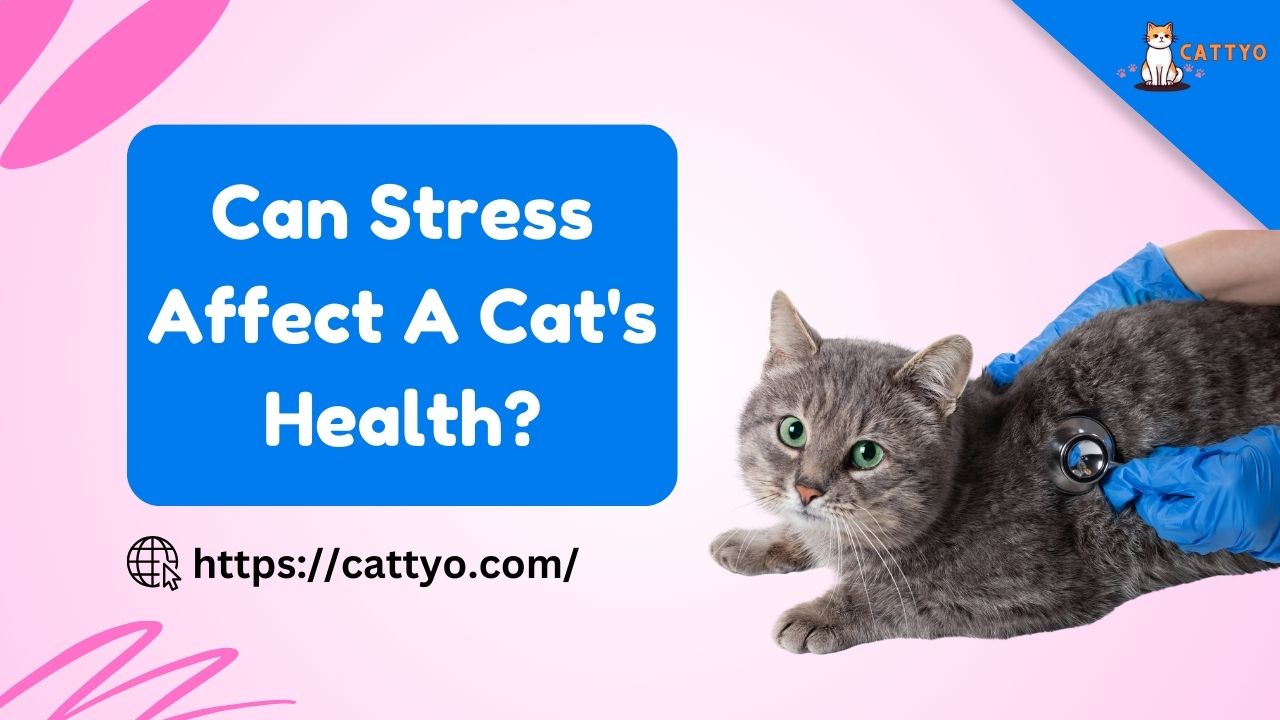Have you ever noticed Fluffy hiding under the bed a bit longer than usual or munching on her kibble without enthusiasm?
You might be thinking, She’s just being a typical cat, but what if stress is the culprit? Let’s dive into the whiskered world of our feline friends and explore whether stress can truly impact a cat’s health.
Can Stress Affect A Cat’s Health?
Stress can significantly impact a cat’s health, leading to issues like loss of appetite, urinary problems, and even behavioral changes. Long-term stress weakens their immune system, making them more susceptible to illness. Understanding stress triggers and providing a calm environment is key to maintaining your cat’s well-being.
So ,we say that, The official answer is Yes, stress can have a significant impact on a cat’s health. Like humans, cats experience physical and behavioral changes when under stress, which can affect their overall well-being. Common signs of stress in cats include:
- Loss of Appetite – Stress can lead to reduced eating or even complete refusal of food, which can result in weight loss and malnutrition.
- Urinary Issues – Stress is a major cause of urinary tract problems, such as cystitis or inappropriate urination, particularly in male cats. This can lead to frequent trips to the litter box or accidents outside of it.
- Behavioral Changes – Stress can cause a cat to become more aggressive, withdrawn, or clingy. It may also trigger destructive behaviors, like scratching or biting.
- Gastrointestinal Problems – Stress can lead to vomiting, diarrhea, or constipation as a result of an upset stomach or changes in the gut’s function.
- Weakened Immune System – Chronic stress can suppress a cat’s immune system, making them more susceptible to infections and other health issues.
- Excessive Grooming or Hair Loss – Cats under stress may groom excessively, leading to bald spots or skin irritation.
Identifying and addressing the sources of stress—whether it’s environmental changes, loud noises, or a new pet—can help minimize the negative effects on a cat’s health.
Creating a calm, secure environment with plenty of hiding spaces, enrichment, and regular routines is key to reducing stress and promoting long-term health.
The Hidden Struggles of a Purring Companion
Imagine this: You’ve just moved to a new home. Boxes everywhere, unfamiliar smells, and the chaos of unpacking. Your usually serene Siamese, Mr. Whiskers, starts showing signs of anxiety. Does this mean stress affects him? Absolutely.
What Exactly is Stress for Cats?
Stress in cats isn’t just about being annoyed by a loud vacuum cleaner or the neighbor’s dog barking incessantly. It can stem from a myriad of factors—changes in the environment, introduction of new pets, or even alterations in their daily routine. But how does this translate to their health?
Physical Health: More Than Just a Fluffy Coat
When cats are stressed, it’s not just their mood that takes a hit. Physical health can suffer too. From digestive issues like vomiting and diarrhea to more severe conditions such as urinary tract infections, stress can be a silent saboteur. Have you ever heard a cat sneeze? It’s rare, but when combined with other symptoms, it might signal stress-related problems.
Table Of Common Stressors and Their Health Impacts on Cats
Stress can negatively impact a cat’s health, causing both physical and behavioral issues. It can lead to appetite loss, urinary problems, gastrointestinal distress, and even weakened immunity.
Chronic stress can also cause changes in behavior, like aggression or excessive grooming. Identifying and minimizing stressors is crucial to ensuring a cat’s overall well-being.
Below is a table outlining common stressors and their potential health impacts on cats.
| Stressor | Possible Health Impact |
|---|---|
| Moving to a new home | Anxiety, hiding, changes in appetite |
| Introduction of a new pet | Aggression, territorial behavior, stress ulcers |
| Loud noises (e.g., fireworks) | Increased heart rate, digestive issues |
| Changes in routine | Anxiety, litter box problems, excessive grooming |
| Lack of stimulation | Obesity, depression, destructive behavior |
Emotional Well-being: The Heart of the Matter
Cats might be independent, but they have feelings too. A stressed cat can develop behavioral issues like aggression or withdrawal. Ever tried to pet a grumpy cat? It’s not just a bad day—they might be signaling deeper stress-related distress.
Anecdote: Whiskers’ Wake-Up Call
Take Whiskers, for example. After his family adopted a playful puppy, he became skittish, avoiding his favorite sunlit spots and refusing to eat his beloved salmon treats. It took a few adjustments—like creating separate spaces and gradually introducing the puppy—to restore his peace. Sometimes, the solution is as simple as understanding and patience.
The Domino Effect: Stress and Immunity
Stress doesn’t just stop at the surface. It can weaken a cat’s immune system, making them more susceptible to illnesses. Think of it as a domino effect—stress leads to behavioral changes, which then lead to physical health issues. It’s a cycle that can spiral if not addressed.
Spotting the Signs: Is Your Cat Stressed?
How can you tell if your cat is stressed? Here are some red flags:
- Changes in Appetite: Either overeating or loss of appetite.
- Excessive Grooming: Leading to bald spots or skin issues.
- Litter Box Problems: Urinating or defecating outside the box.
- Aggression or Withdrawal: Uncharacteristic biting or hiding.
- Vocalization: Increased meowing or yowling without reason.
Shifting Perspectives: It’s Not Always Clear-Cut
Sometimes, it’s tricky to distinguish between a bad mood and genuine stress. After all, cats do have their moody days. But if the signs persist, it’s worth investigating further. Maybe a visit to the vet or a chat with a feline behaviorist is in order.
Coping with Cat Stress: What Can You Do?
Wondering how to help your furry friend? Here are some tips:
- Create a Safe Space: A quiet area where your cat can retreat.
- Maintain Routine: Keep feeding and playtimes consistent.
- Provide Enrichment: Toys, scratching posts, and interactive games.
- Use Pheromones: Products like Feliway can help calm anxious cats.
- Gradual Introductions: When adding new pets, take it slow.
Personal Reflection: My Journey with Luna
I remember when Luna, my tabby, started acting out after we had a baby. The sleepless nights and new sounds were overwhelming for her. Investing in a cozy cat tree and spending extra time cuddling her made a world of difference. It’s incredible how small changes can create a big impact on their well-being.
Frequently Asked Questions
Q: Can stress cause cats to become aggressive?
A: Yes, stress can lead to aggression as cats may feel threatened or insecure in their environment.
Q: How long does it take for a stressed cat to recover?
A: Recovery time varies. Some cats bounce back within days, while others might take weeks or even months, depending on the severity of the stressor.
Q: Are there any natural remedies to help reduce cat stress?
A: Yes, products like feline pheromone diffusers, herbal supplements, and ensuring a stimulating environment can help alleviate stress.
Q: Should I take my stressed cat to the vet?
A: If you notice persistent signs of stress or if your cat’s health is declining, it’s best to consult a veterinarian for professional advice.
Q5: Can multiple cats in a household help reduce stress?
A: Not necessarily. While some cats enjoy companionship, others may feel more stressed with additional cats. It depends on the individual cat’s personality.
Final Observations
So, can stress affect a cat’s health? The answer is a resounding yes. From emotional turmoil to physical ailments, stress plays a significant role in a cat’s overall well-being.
But fear not! With a bit of understanding, patience, and some thoughtful changes, you can help your whiskered companion lead a happy, healthy life. After all, a content cat makes for a joyful home.






